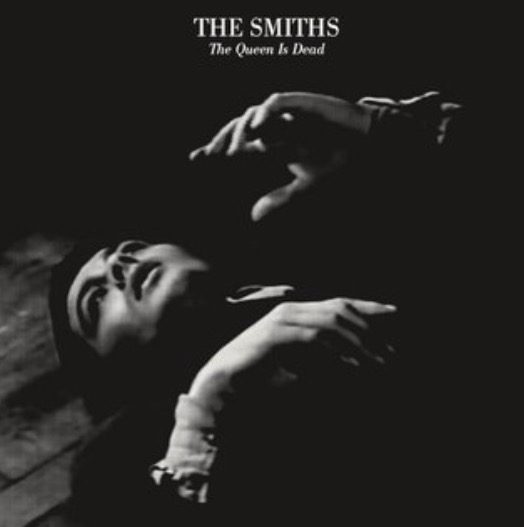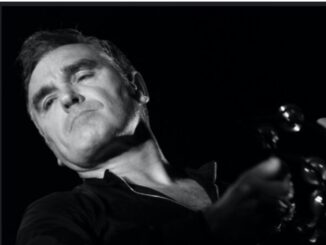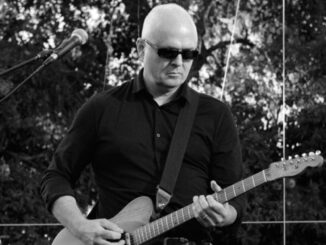Review By DAN MACINTOSH
The Queen Is Dead offers all the evidence anyone will ever need to prove The Smiths’ genius. Originally released in June of 1986, it is 37:07 of soul-bearing music, and all a tremulous heart requires.
Rhino has just reissued a remastered version of its original ten songs, along with one disc of additional recordings and another of a concert recording from Boston’s Great Woods Center for the Performing Arts, tracked on August 5th of 1986.
The original Smiths album is exemplary on so many levels, it’s difficult to know where to begin singing its praise chorus. Guitarist Johnny Marr’s guitar skills range from the reckless electric wah-wah wonderland of its title track, to the energetic acoustic strumming driving “Bigmouth Strikes Again,” to the chiming fills packing the lilting “The Boy with The Thorn in His Side” with empathetic good vibes. Yes, Morrissey’s self-deprecating – yet heartening — lyrics may have initially captured our attention, but it was (and is) Marr’s flare for the inventive six-stringing that keeps us playing in our mental playlist.

Morrissey’s Personal Songs
Although Morrissey hits his social/political targets when aiming at the royal family with the title tune, it’s his personal songs of youthful desperation that set these recorded tracks apart from so much alternative rock braggadocio (both then and now). “There Is a Light That Never Goes Out” has since become a Morrissey concert anthem, even though the apparent optimism suggested by title is more than a tad ironic.
For example, there’s nothing bright about the sexual frustration expressed when Morrissey admits: “And in a darkened underpass/I thought: ‘Oh God, my chance has come at last!’/But then a strange fear gripped, me/And I just couldn’t ask.” Darker still, is the longing to experience a relief that might only come from death, which has never been expressed better than “I Know It’s Over.” “Oh mother,” Morrissey signals, “I can feel the soil falling over my head.” This same song includes a bridge that reads like someone playing devil’s advocate with Morrissey. “If you’re so very entertaining/Then why are you on your own tonight?”
Yet another standout track, “Never Had No One Ever,” is like an Etta James soul-blues lament, by way of Manchester, England. The life of its protagonist has been nothing short of a nightmare — up to this point. “I had a really bad dream/It lasted 20 years, 7 months, and 27 days.”
Video by Katzenheimer:
Smiths Thumb Nose at Authority
Even the Smiths album’s lighter moments serve a greater purpose. “Frankly, Mr. Shankly,” thumbs its nose at authority, while simultaneously expressing an unbridled ambition. “Vicar in a Tutu” expresses unlikely empathy for a religious hypocrite, and “Cemetry Gates” pictures Morrissey in a place we’d most likely expect to find him — in a cemetry, reading the tombstones of famous literary figures. Ironically, this same man that discounted his professor’s qualifications with “Frankly, Mr. Shankly,” speaks like an authoritative teacher when analyzing another’s plagiarized poetry during “Cemetry Gates.”
The album’s additional recordings shed new light on the band’s creative process in some places, but very little others. The demo for “Never Had No One Ever,” for instance, features Morrissey scatting with a horn section at track’s end. A horn section on a Smiths song? Whodathunkit? This early take also includes derisive laughter, which sounds like Morrissey himself providing fake-laugh sarcasm. However, “Bigmouth Strikes Again” sounds very much like the final recording. This re-release thankfully includes a few essential B-sides from this period, which would have been A-Sides for most other acts.
Video by Katzenheimer:
Record Collection as Friend
“Rubber Ring” is sung from the perspective of a man’s record collection; his only friend when he was young. This record collection personified gently asks to not be forgotten, once bedroom agoraphobia is finally overcome. “Asleep,” another memorable B-side, is a piano ballad that finds Morrissey longing to die in his sleep (Are you seeing a pattern?). It’s as tragic, as it is sincere. Although “Money Changes Everything” is a half-formed Marr instrumental, “Unlovable,” this set’s final B-side, is Morrissey at his self-deprecating best. “I wear black on the outside, ‘cuz black is how I feel on the inside,” he tells us. We believe him unquestionably because he’s convinced us it is so.
The live set gathers up a goodly portion of The Queen is Dead tracks. It also finds the band performing its sexiest song, “Stretch Out and Wait,” which is as philosophical as it is romantic, and “Is It Really So Strange,” a song about determined love. Morrissey sings the latter song’s assertive lyrics over a jaunty, Marr rockabilly groove. Both songs remind us how, in Morrissey’s view, love is an illusive prize well worth finding.
The Queen is Dead is Manchester’s best, at their best. And to paraphrase one of its songs, if you don’t believe us now, will you ever believe us?



